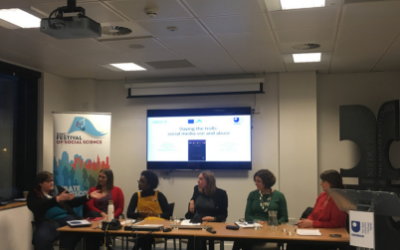You are here
- Home
- Law
- Welsh Assembly Member backs new calls to regulate online abuse against women following research
Welsh Assembly Member backs new calls to regulate online abuse against women following research

Joint research between The Open University and Stirling University has uncovered the extent of online abuse against women. In their forthcoming book ‘Online Misogyny as a Hate Crime: A Challenge for (Legal) Regulation’ Dr Kim Barker and Dr Olga Jurasz call for greater legal recognition of the problem and how abuse online is tackled.
The team introduced their research at ‘Slaying the trolls: Social media use and abuse’, which took place at the The Open University in Wales’ head office in Cardiff on 5 November. They were joined by people with their own expertise and experience, including Rhondda Assembly Member Leanne Wood.
Like many other women, I have been subject to messages that have crossed the boundaries of what is acceptable. I have, on occasion, been forced to report matters to the police because of the serious and graphic nature or threats in some of the comments made. I daily see attempts to silence women and minorities online and we all have to stand together and take a stand against it. We all have to refuse to be silenced by the online bullies. There is a duty on all of us to challenge threatening and other hateful or unacceptable behaviour because if it is left unchecked, it will give licence to bullies, racists, homophobes and misogynists to do as they please – and that cannot be allowed to happen. There is also a duty on the relevant authorities to take appropriate action when dealing with online abuse complaints to ensure that a strong message is sent out to all would-be perpetrators.
Leanne Wood AM
The risk of young women aged between 18 and 29 years becoming a target of threatening and offensive advances on the internet is twice as high as the risk for women aged between 40 and 49 years, and more than three times as high as the risk for women aged between 50 and 59 years. A 2016 study by DEMOS which investigated the scale of misogyny on social media showed that in the period of three weeks when the study was taking place, 6500 users in the UK were targeted by 10 000 tweets of an explicitly aggressive and misogynistic nature.
Fundamentally, what our research shows is that combatting online misogyny is a matter of ensuring equality of participation in the public sphere.
Dr Olga Jurasz
The Open University
Throughout the course of this research, what we’ve found is that ultimately that law alone cannot resolve the issue of online harassment. We need to have better laws dealing with online abuse – and stronger enforcement.
Dr Kim Barker
Stirling University
Here are the team’s recommendations:
- Online violence against women needs to be recognised as a form of gender-based abuse of women and girls
- Gender should be incorporated as a protected characteristic in hate crime legislation in Scotland, England & Wales.
- Combatting online gender-based hate requires multilevel and multi-stakeholder input.
- The approach to regulation and tackling of online gender-based hate should involve: liability of individuals who post hateful content online, and greater liability of platform providers.
To view the whole article including clips from the panel speakers, please visit the original article on the OU in Wales website.